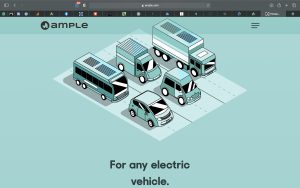The importance of EV Range.
On CNET’s Road Show site, Tim Stevens just published a feature about Audi CEO Markus Duesman. Duesman had some interesting things to say about Audi’s future EV plans. But Duesman surprised me by saying that he expected premium EVs would probably have less range than current offerings.
Stevens quotes the Audi CEO as saying “Today you go to the gas station and get your fuel and it’s very natural how you get your energy for driving. With electric cars it’s not that natural, you have to adjust your behavior a bit. But once you’re used to that I think battery sizes will go down again, because they make the cars unnecessarily heavy and unnecessarily expensive. And unnecessarily big, too.”
Will consumers prefer shorter range EVs?
It’s obvious that we will see smaller, more nimble EVs in the future. But I am not sure that buyers want to trade driving range for smaller, lighter transportation.
I don’t have any statistics to back me up, but I think the specter of running out of juice on the highway is keeping many people from choosing an EV for daily transportation. With an ICE vehicle, you can refuel and be back on the road in a few minutes. Most people assume EV charging takes a while, even using fast charging. No one wants to be stranded away from home waiting to top off their EV batteries.
Of course, the technology to quickly charge an EV battery pack will undoubtedly improve. But if you are a heavy cell phone user, you already know that fast charging decreases overall battery life. Perhaps battery makers will find a way to charge up in minutes without stressing out those expensive EV batteries. Until they do,however, frequent fast charging could reduce the overall lifespan of a battery-powered vehicle.
Range vs Time waiting to Charge
So unless fast charging can be implemented without prematurely aging batteries, drivers will be limited to how far they can travel before needing to juice up. I don’t want to wait an hour, or even a half-hour, when I am on a road trip. If I can drive an entire day without needing to charge, I won’t have to worry about charging.
When I used to drive on photography assignments or family road trips, I usually tried to average 500 miles a day. Sometimes I would run longer, but less than 500 miles seemed like slacking off.
That 500-mile rule of thumb is beyond the capabilities of most current EVs. Many struggle to reach half that.
Of course, if you can plan your charge intervals to coincide with dinner and bathroom breaks, maybe that distance is within reach. But I anticipate some anxiety if you running late, your destination is miles away and your batteries are running low. Do you stop and recharge? Or do you take a chance you can make it without getting stranded far from a charging station?
There is also the problem that the range of current batteries decreases over time. If your EV can go 250-miles on a charge brand new, what will the range be when it is five years old?
Can manufacturers get away with offering short EV Range?
For these reasons, I suspect that range will remain a big concern for most drivers. I think most of us would be comfortable with an EV that can go 500-miles without charging. People may be willing to accept a lesser range because of the limitations of the technology. But as manufacturers find ways to extend the driving scope of EVs, I think range will be a big selling factor for most consumers.
Time will tell. Maybe there is a role for light, run to drive, shorter range EVs in the future. For most of us, I think it is a safe bet that most of us would prefer larger batteries with a greater range.
Check out the Tim Stevens piece on the Road Show site


Be First to Comment